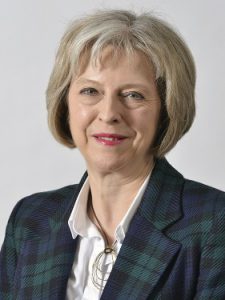On Monday, Great Britain stood poised to enact Brexit with Her Majesty’s blessing. UK Prime Minister Theresa May announced that her government would send the letter officially triggering the UK’s exit from the European Union, in accordance with Article 50 of the Lisbon Treaty, on March 29 – more than nine months after the British people voted to extract themselves from the global governance institution.
 The notification will touch off a two-year-long period of negotiations that will determine the UK’s future relationship with the EU – its largest single trading partner, responsible for £220 billion, or 44 percent, of its £510 billion in exports and an outright majority of its imports.
The notification will touch off a two-year-long period of negotiations that will determine the UK’s future relationship with the EU – its largest single trading partner, responsible for £220 billion, or 44 percent, of its £510 billion in exports and an outright majority of its imports.
Free trade advocates, ranging from MP Daniel Hannan to the Institute of Economic Affairs (IEA), suggest the best outcome would be membership in a European free trade union, but not a customs union.
For non-Europeans, these terms can be confusing. What’s the difference?
Free trade union: A free trade union allows member nations to exchange goods across national boundaries without imposing tariffs or other trade barriers. Otherwise, it respects member states’ freedom to negotiate their own trade policies with outside nations.
Customs union: A customs union allows free trade among member nations but imposes a tariff between its collective membership and those outside. Members of the customs union cannot negotiate their own free trade agreements with nations that do not belong to the union.
The European Free Trade Association (EFTA) is a free trade union, while the European Union is a customs union, as well as a body of supranational governance. While EFTA members may export their goods to the EU’s 28 member states tariff-free, they retain the power to enter into free trade agreements whose terms conflict with those negotiated by Brussels.
EU members must adopt all the regulations as passed in Brussels word-for-word, as well as all the rulings of the European Court of Justice, and are required to allow the free movement of populations between EU nations. They must also enforce the Common Customs Tariff (CCT), which taxes imports from non-EU members at potentially steep rates. For instance, the Common Agricultural Policy (CAP) sets average tariffs on agricultural products produced outside Europe at 18 percent – a policy critics say distorts the economy and hurts consumers. “The CAP involves the government in contributing to EU farm subsidies, only a small part of which returns to UK farmers; this money forms part of our EU budget contribution,” writes Economists for Free Trade, whose members include former Margaret Thatcher adviser Patrick Minford. “However, the key damage to the UK economy from the CAP comes from the massive raising in farmers’ prices (by some 20 percent according to our and OECD estimates).”
Why it matters: UK officials must now negotiate their ongoing relationship with the EU. As such, they must navigate the narrow and contentious territory between preserving their national sovereignty – which assures that their policies reflect the will of their citizens, rather than that of EU bureaucrats – and maintaining their access to the European market and thus assuring their nations’ prosperity. Striking the right balance will preserve the deep-seated transatlantic values of representative government and economic opportunity and dynamism.
(Photo credit: UK Home Office. This image has been cropped. CC BY-SA 2.0.)

